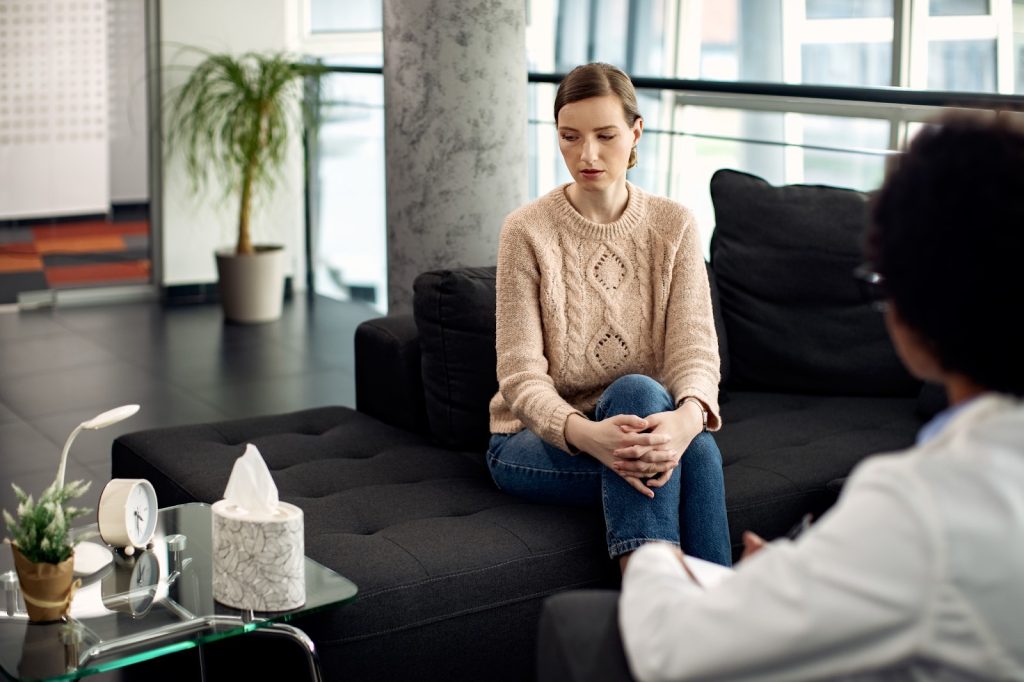If you’re living with anxious thoughts, it may reach a point where you feel you need medication. But before you pop that prescription, have you considered psychotherapy?
In truth, seeking professional psychiatric support from a qualified professional can be just as effective as pharmaceuticals for some anxiety sufferers. Even better? Therapy in conjunction with medication can combine to produce excellent results for many patients presenting with anxiety disorders.
So what are the best types of therapy to treat anxiety? To learn more, stay with us as we discuss different types of anxiety therapies to help you decide which one could be best for you.

Anxiety Therapy Through Safe Exposure to Triggers: Both Imagined and Real-World Scenarios
Exposure therapy – also known as systematic desensitization therapy – is one of the most commonly used treatments for anxiety. Does this make it the best? Perhaps. At least, one of the best, that is.
Gently exposing anxiety sufferers to their fears can elicit dramatic recovery results: a 2013 study of the results of exposure therapy on PTSD-suffering war veterans found significant reductions in their anxiety symptoms following treatment. So how does it work?
Acceptance and Commitment Therapy: Learning to Live With Your Anxiety Disorder
Often when we have a negative or anxious thought, our first instinct is to suppress it. Acceptance and commitment therapy, however, encourages anxiety sufferers to sit with their emotions, process them, and deal with them head-on. But how does it do this?
By accepting rather than rejecting our thoughts, we are both acknowledging them and allowing ourselves to understand them. Burying our heads in the sand may feel like the easy solution short term, but in the long run, the anxious thoughts won’t go away – they’ll rise to the surface again the moment we feel triggered. Instead, navigating our anxious thoughts using what is known as cognitive defusion helps us separate anxiety from rational thought.
If this perspective sits well with you, this treatment method may well be your cup of tea.
CBT or DBT for Anxiety: Which One is Better?
Just like acceptance and commitment therapy, CBT and DBT also help us to rationalize our anxious thoughts.
Short for Cognitive Behavioral Therapy and Dialectic Behavioral Therapy, these two cognition-based treatments are similar. But how do they differ?
While CBT helps sufferers identify their anxious thoughts and turn them around by rebutting them with pragmatic solutions, DBT works on emotional regulation and helps patients see the world through a less emotion-driven lens.
Each of these therapies is widely used to treat anxiety disorders and might be most suitable if you find yourself to be deeply emotional in your anxiety.
Interpersonal Therapy: Soothing Your Social Relationships
As the name would suggest, interpersonal therapy focuses on your relationships with other people. It helps you navigate your social interactions with other humans, and also, identifies how your anxiety affects them.
After all, is not the single most important thing in life our relationships with those around us?
Interpersonal therapy helps us improve these, and make the most of our emotional connections.
~
While exposure therapy may be one of the most common therapies used to treat anxiety, that doesn’t necessarily mean it’s the best. Arguments for and against the many other types of therapy – such as acceptance and commitment therapy, CBT and DBT, and interpersonal therapy, for instance – may signal that these treatments will work better for you.
In truth, the best therapy for anxiety is the one that suits you best – that is to say, the one that you respond to, and that resonates with you. If you’re a student, it might be speaking with an on-campus professional who has completed an online masters school counseling. But you’ll never know unless you try.
This can only be uncovered through trial and error, and applying different treatment methods until you find ‘the one’. The only way to do this? Make that therapy appointment. Once you’ve worked through your issues with a therapist, you may find you no longer need medication.
Author Name: Sara Chenchabi
Author Bio: Sara is a Melbourne-based writer who is passionate about all things travel, fashion, and food. She loves writing blogs about her weekends spent wining, dining, and bar-hopping across Melbourne’s array of world-class hospitality venues. When she’s not writing or enjoying a meal out with friends, Sara enjoys listening to music, going to Pilates, and walking in nature.
Author image: Attached
Author LinkedIn: https://www.linkedin.com/in/sara-chenchabi/
